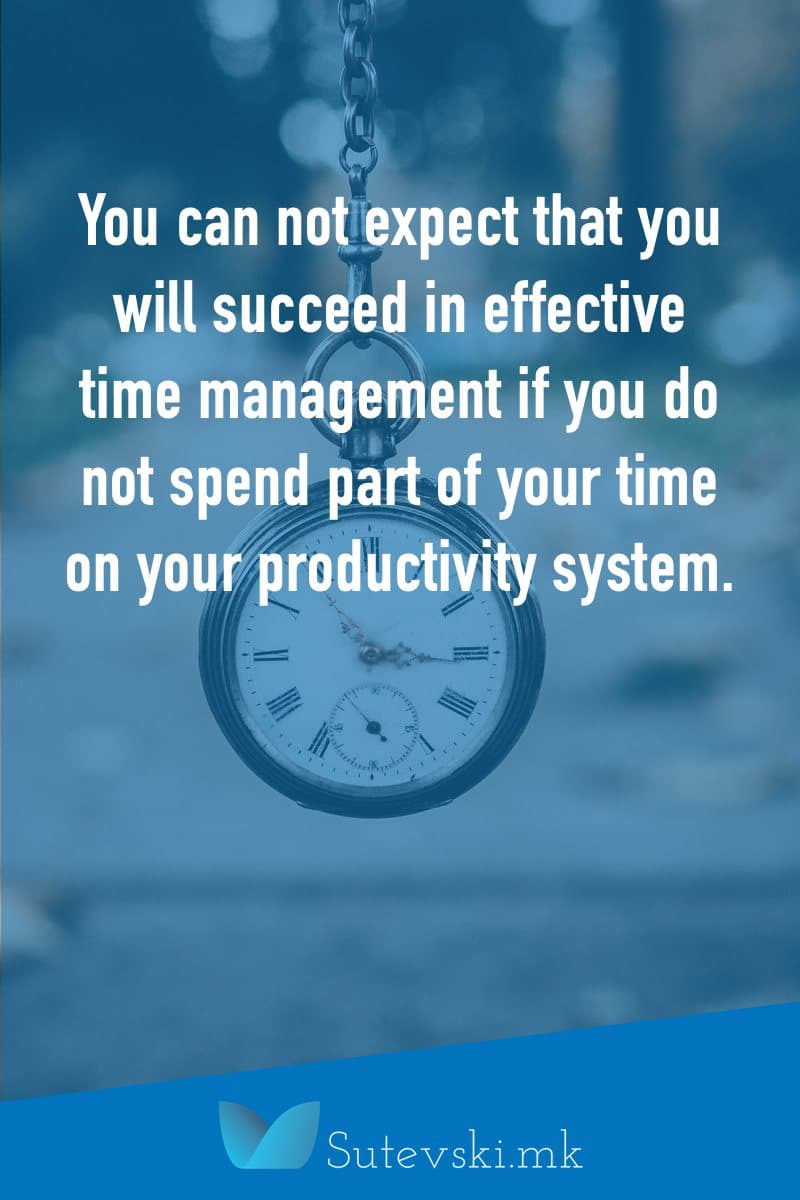How you can set up a system approach in effective time management?
Well, when we talk about the business, it’s not enough to talk only about you as an entrepreneur and your time. For complete success, you need your team members to manage their own time successfully. But, believe me, if you succeed with you, you can transfer your good practices to your employees.
You are the leader, as an entrepreneur, and I understand that your leadership capabilities are at a high level to create a kind of behavioral pattern on your team members.
Now when it comes to time management as part of providing personal productivity, an issue that often appears is the question which system to use. But, in my experience, although there are specific systems and suggestions from experts in this field, they never worked in their full perfection for me. Also, they never worked for anyone with which I have worked in the past. This means that different systems have different weaknesses. For example, I use GTD, or David Allen’s “Getting Things Done” system, but not entirely as suggested by the author, but just as a frame adjustable to my personal and customized needs.
Often I am talking about the existence of uncertainty, which exists and can not and should not be avoided. It may be difficult to manage, but there are some good sides. In such an environment where there is substantial uncertainty, it is not logical to expect that your tasks will move with the linear function. This is impossible.
That’s why it’s not possible to say this system or the specific process you will need to achieve success in time management. However, it will depend on many factors related to the design of your work, but also the environment in which you do your job. That’s why I will not propose any specific system or a process you should use, but I will speak of a strategic framework for such a system.
First, I have to mention that it doesn‘t matter what you will use. Or whether you will use a pen and a notebook or a more sophisticated technical solution. Perhaps it’s good to start with questions related to how you are currently doing your tasks, where you record the jobs, how you follow your works, how you organize your to-do list, what tools you use to measure time and performance, and so on.
When you already know what you are using and what you need, you will see the process that you are currently using and its disadvantages that will require proper improvement.
But let me discuss some recommendations that you should implement.
1. Make sure your goals are SMART goals.
What you will need to do will depend on the decision to prioritize, i.e., what comes first, second and third, and so on. But you will not succeed in this intent if you do not provide sufficient clarity on your goals that will shape your priorities in large part.
- So the goals should be specific, or to refer to something specific that you want to achieve.
- Then they need to be measurable so you can know if and how you’ve met those goals.
- Further goals should be achievable because you can neither follow nor control the unachievable goals.
- The goals should be both realistic and time-limited.
Although all the features of the goals are essential for effective time management, especially the last one is important. It is important because it limits the time you spend on activities related to achieving a specific goal at the start. In this way, you already have an appropriate framework in which you need to operate.
Imagine a goal to increase the revenue by 20%. Although this goal is specific because it relates to your earnings and is measurable because we can compare what our incomes are and what are they now and whether they are increased by 20%. Also, this goal is achievable because you did not overdo it with figures like 300% or 500% and is realistic because in the past you had a growth of 15%. Still, this goal is not time-limited, and all previous features are unimportant when we do not know when to reach it and for which period to compare. Therefore, you must first ensure that your goals are SMART goals.
2. Invest part of your time for a better organization
You can not expect that you will succeed in effective time management if you do not spend part of your time on your productivity system. Yes, you must invest part of your time to ensure that you are an organized person.
Now some activities for a better organization will be easy, and you can quickly implement them as a working room arrangement. But some will require more time and will be more challenging to implement. The difficulty will be more substantial especially if they contain a change in some current habits, which I must admit is difficult. Therefore, you must be sure that you provide sufficient flexibility in your time to have time for some of these activities. They are essential because they will ensure more effective time management not today but tomorrow, the day after tomorrow or after a month.

3. Do not try to achieve perfectionism
Perfectionism is impossible. If perfectionism is 100%, do you think that 95, 90 or 80% is not a perfectionism? Yes, theoretically it looks like that. But still, what do you think when you see your present? How much are you achieve now? Do you realize everything as you have imagined? What do you think about the percentages, are they 60%, 50% or something else? Only in this way you realize that it is more than necessary to do something now than to plan something for tomorrow, next week, next month, or next year.
Perfectionism is often the biggest enabler of procrastination. Excuses in the style of “if I can think of this a little better,” lead to delaying something significant for you.
Therefore, when you create your system that will lead to effective time management, be careful not to look for perfectionism. The most successful persons allow a minus 20-30% distance from the perfect. It needs to be good enough if you want to bring benefits for you.
4. Divide your daily time into parts
How you spend your daily time? Let’s take the full 24 hours now and analyze it.
What types of time categories will you have?
- First, you will have a biological time or a time to sleep, eat, exercise, perform basic physiological needs and maintain a high level of health.
- Then you will have time for your family in which you will talk with your family members, learn with your children, playing with children, and everything else that makes you strongly associated with your loved ones.
- You will also have time for administrative matters in which you will prepare your day, which means planning and preparing everything you will need to do in your next time category. This time category will have a substantial impact on the next group, but you must be clear that you must not allow this category to prevail with you.
- The next type and most important when it comes to your work is your productive working hours in which you perform the tasks planned during the administrative time. This time is a time that adds, or have the potential to add value to your work. This category does not include coffee, lunch, pause, the request of a document or a few hours’ meetings. These activities are easily classified into any of the next categories of your daily time. This category includes the time you spend on performing your own tasks, or the time after you find the document on your computer after you open it and after you start writing that document. I have just mentioned this example because sometimes you can easily find yourself in a situation to spend ten minutes finding the document and then start with the real thing. This time you spend refers to that real work, not arriving at the right thing.
- Then you will have a time for socialization that will contribute to relaxation and re-energizing, but also build relationships, networks, and potential partnerships. Drinking coffee, talking with colleagues, potential customers, or communicating through social media is the time you spend in this category.
- Last, you will have lost time, or “garbage” or “waste,” or the time you spend at a meeting couple of hours that can be done in about twenty minutes, or the time of watching the favorite series, or time of several hours web browsing, etc. You must eliminate this time, or keep it to a minimum. So, when it comes to perfectionism, this is the time to focus and try to remove 100% or at least 90%.
The goal of such an analysis and categorization of your time is to try to work smarter rather than longer.
5. Working Procedures
And as the last recommendation, I want to mention here is to create working procedures for the main tasks that you have. So, when you discard all the activities that you carry out in your lost time category, you will clear up the activities in productive time, you determine the procedures for your actions.
Working procedures are essential if you want to achieve success in effective time management.





